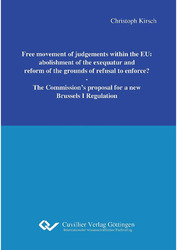| Areas | |
|---|---|
| Serie de libros (96) |
1380
|
| Nachhaltigkeit |
3
|
| Gesundheitswesen |
1
|
| Letra |
2368
|
| Medienwissenschaften | 16 |
| Teología | 57 |
| Filosofía | 102 |
| Derecho | 422 |
| Economía | 851 |
| Ciencias sociales | 417 |
| Ciencias del deporte | 48 |
| Psicología | 233 |
| Educación | 190 |
| Historia | 183 |
| Arte | 111 |
| Ciencias culturales | 166 |
| Literatur | 117 |
| Lingüística | 88 |
| Ciencias Naturales |
5408
|
| Ciencias Ingeniería |
1794
|
| General |
98
|
|
Leitlinien Unfallchirurgie
5. Auflage bestellen |
|
Erweiterte Suche
Free movement of judgements within the EU: abolishment of the exequatur and reform of the grounds of refusal to enforce? (Tienda española)
The Commission`s proposal for a new Brussels I Regulation
Christoph Kirsch (Autor)Previo
Indice, Datei (51 KB)
Lectura de prueba, Datei (59 KB)
On 14 December 2010 the European Commission presented its Proposal to amend the most important instrument on European international civil procedure, the Regulation 44/2001 (´Brussels I`). Against the background that European law guarantees economic freedoms cross-border recognition and enforcement of judgments within the European Union is of considerable and increasing importance. Brussels I provides for a simple and accelerated procedure to obtain the required declaration of enforceability (the exequatur) in the Member State of enforcement. In order to further enhance the free movement of judgments within the EU the general abolishment of this exequatur lies at the heart of the Proposal. It is accompanied by plans to reform the existing defences.
This dissertation provides an analysis and discusses the most relevant aspects of the abolishment of the exequatur and the reform of the defences under the Proposal. After providing the background on the Proposal and its underlying principles, the cross-border enforcement regimes of Brussels I and the Commisson`s Proposal are briefly presented. The abolishment of the exequatur is critically discussed with regard to its underlying rationales and the functions of the exequatur. The chapter concludes with the implications of the abolishment for the existing defences. The reform of the defences is discussed in debt in the third chapter with regard to the questions whether the Proposal provides sufficient protection and complies with the principle of mutual recognition. Particular emphasis is put on the ordre public defence and its fundamental rights implications. Suggestions to amend the Commission`s Proposal are made throughout the paper and briefly summarised in the final conclusion.
| ISBN-10 (Impresion) | 3869559845 |
| ISBN-13 (Impresion) | 9783869559841 |
| ISBN-13 (E-Book) | 9783736939844 |
| Formato | A5 |
| Idioma | Inglés |
| Numero de paginas | 72 |
| Laminacion de la cubierta | Brillante |
| Edicion | 1 Aufl. |
| Volumen | 0 |
| Lugar de publicacion | Göttingen |
| Fecha de publicacion | 16.01.2012 |
| Clasificacion simple | Tesis de master |
| Area |
Derecho
|








